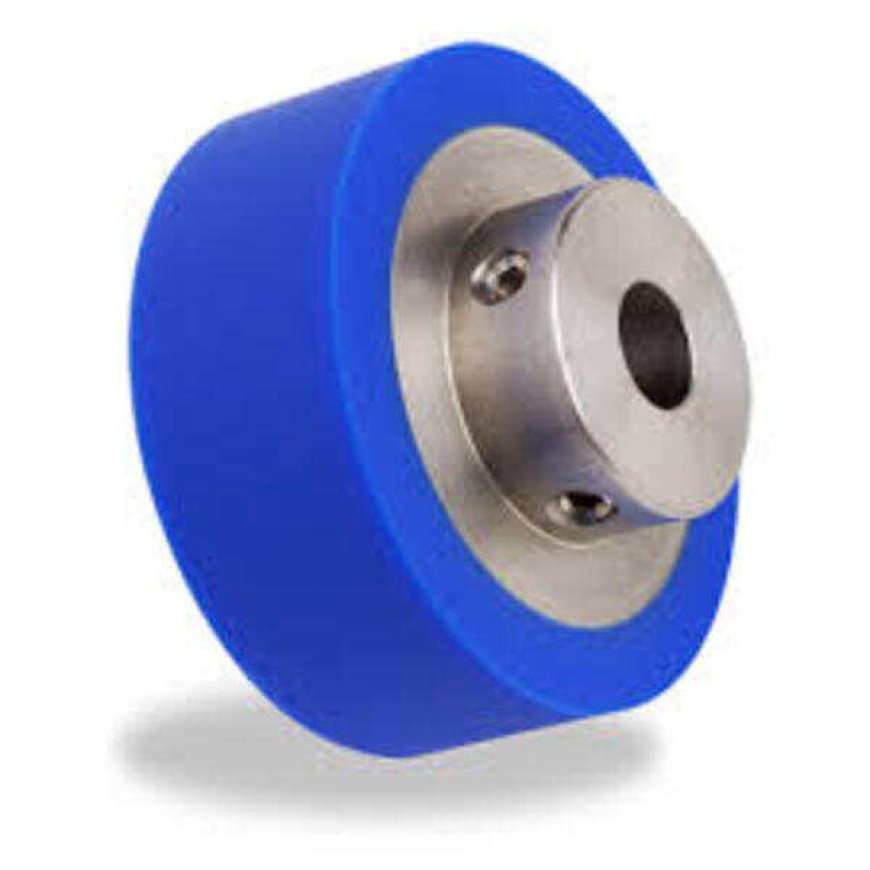What Makes Polyurethane Rollers the Best Solution for Conveyor Systems?

In the world of material handling, conveyor systems play a pivotal role in ensuring smooth and efficient movement of products through various stages of production and packaging. One critical component that ensures the reliability and performance of these systems is the rollers used within the conveyors. While there are many types of rollers available, polyurethane rollers, or poly rollers, stand out as one of the best solutions for conveyor systems. Whether in industrial or commercial settings, polyurethane rollers offer a range of benefits that improve efficiency, reduce maintenance, and extend the lifespan of the system. In this blog, we will explore the reasons why polyurethane rollers are the ideal choice for conveyor systems.
Durability and Longevity
One of the primary reasons polyurethane rollers are considered the best solution for conveyor systems is their unmatched durability. Polyurethane is a highly resilient material known for its resistance to wear, abrasion, and impact. Conveyor systems operate continuously, often under heavy loads and high stress. Polyurethane rollers are designed to withstand these demanding conditions without degrading quickly.
Compared to other materials like rubber or metal, polyurethane offers superior resistance to damage caused by friction and heavy impact. Whether you’re dealing with lightweight items in a commercial setting or heavy machinery parts in an industrial setting, poly rollers are built to last. This durability translates to longer service life, fewer replacements, and less frequent maintenance, making them a cost-effective option for conveyor system operators.
Resistance to Harsh Environments
Conveyor systems in industrial and commercial applications often operate in environments that are tough on equipment. Temperature extremes, exposure to oils, chemicals, and moisture can all take a toll on rollers, leading to premature wear and equipment failure. Polyurethane rollers excel in such harsh environments, offering impressive resistance to chemicals, temperature fluctuations, and moisture.
In industrial settings, industrial polyurethane rollers are frequently exposed to oils, solvents, and various chemicals. Polyurethane’s inherent resistance to these substances ensures that the rollers will continue to perform effectively without corroding or losing their strength. Additionally, poly rollers are highly resistant to extreme temperatures, whether in freezing cold environments or high-heat conditions. This resistance ensures that conveyor systems run smoothly without the need for constant repairs or replacements.
Smooth Operation and Noise Reduction
Another notable benefit of polyurethane rollers is their ability to provide smooth operation, which is crucial for efficient conveyor systems. Polyurethane rollers help minimize friction between the roller and the surface, allowing products to move smoothly along the conveyor. This smooth operation prevents unnecessary strain on the conveyor system and reduces wear on other components.
In addition to providing smooth motion, poly rollers also help reduce noise. In many industrial environments, excessive noise can be a distraction or even a safety concern. Polyurethane's ability to absorb vibrations and operate quietly is a significant advantage, particularly in environments where noise reduction is important. This feature makes polyurethane rollers ideal for use in settings where operators and workers need to communicate or work in a quieter, more comfortable atmosphere.
Load-Bearing Capacity
Conveyor systems often handle heavy loads, and the rollers used must be able to support these items without compromising their performance. Polyurethane rollers are known for their excellent load-bearing capacity, making them an ideal choice for systems that transport heavy or bulky products. Whether it’s moving industrial machinery parts, raw materials, or packaged goods, poly rollers are designed to handle substantial weight.
In comparison to other materials like rubber or plastic, polyurethane retains its structural integrity even under heavy loads. This ability to withstand pressure ensures that equipment continues to operate efficiently, even when subjected to heavy or uneven loads.
In addition to handling heavy weights, polyurethane rollers also reduce the risk of damage to the products being moved. For instance, in industries like automotive manufacturing, where large and delicate parts need to be transported, poly rollers help prevent damage and ensure smooth transitions throughout the production process.
Low Maintenance and Cost-Effective
A major challenge in maintaining conveyor systems is reducing downtime and maintenance costs. Polyurethane rollers offer a solution by requiring very little maintenance. Unlike other roller types that may need regular lubrication, cleaning, or replacement, poly rollers are designed to operate for extended periods with minimal attention. Their durability and resistance to wear mean fewer breakdowns and less frequent maintenance, which leads to cost savings for businesses.
The long service life of polyurethane rollers is another cost-effective benefit. Since they can withstand heavy use, harsh environments, and extreme conditions, the frequency of roller replacements is greatly reduced. This allows businesses to save on repair and replacement costs, ultimately increasing the return on investment in the conveyor system.
Customization for Specific Applications
Every conveyor system has its own set of requirements based on the materials being transported, the environment, and the speed of the operation. Polyurethane rollers can be customized to meet the specific needs of different applications. Whether you need rollers with specific hardness levels, surface textures, or load-bearing capacities, polyurethane rollers can be tailored to suit your exact specifications.
This flexibility is one of the reasons poly rollers are so widely used across a variety of industries. Commercial polyurethane rollers can be designed for lighter loads in retail and packaging environments, while industrial polyurethane rollers can be manufactured to handle the demands of heavy-duty operations like automotive, aerospace, and mining industries. The ability to customize polyurethane rollers makes them adaptable to a wide range of conveyor systems, ensuring optimal performance in any environment.
Industrial Polyurethane Wheels: A Complementary Component
In many conveyor systems, the use of industrial polyurethane wheels alongside polyurethane rollers creates a more efficient material handling process. While rollers guide the movement of materials, wheels help transport them across different surfaces or sections of the system. Polyurethane wheels, like poly rollers, offer superior load-bearing capacity, resistance to wear, and the ability to withstand tough environmental conditions.
When combined, industrial polyurethane wheels and polyurethane rollers provide a seamless system that ensures smooth, reliable, and efficient operation. The wheels facilitate movement over long distances or rough surfaces, while the rollers support smooth transitions and product flow. This combination helps optimize conveyor performance, improve productivity, and reduce maintenance costs over time.
Versatility Across Industries
Polyurethane rollers are incredibly versatile and can be used across a variety of industries, including manufacturing, logistics, food processing, packaging, and more. Their ability to withstand heavy loads, resist harsh environments, and operate smoothly makes them suitable for both industrial and commercial applications.
In the automotive industry, for example, polyurethane rollers are used to move heavy parts through assembly lines with minimal wear and tear. In food processing plants, they help move packaged products without contamination or damage. In warehouses, poly rollers ensure the smooth transport of goods without risk of damage, improving efficiency in supply chains. No matter the industry, polyurethane rollers help streamline operations and keep conveyor systems running at peak performance.
Conclusion
Polyurethane rollers are undoubtedly one of the best solutions for conveyor systems due to their durability, load-bearing capacity, and resistance to harsh environments. Whether used in industrial or commercial applications, these rollers provide smooth, efficient, and cost-effective material handling. With the added benefit of customization, polyurethane rollers can be tailored to meet the specific needs of any conveyor system, ensuring optimal performance in a variety of industries.
When combined with industrial polyurethane wheels, the benefits of poly rollers are further amplified, creating an integrated solution that enhances the performance and longevity of the entire conveyor system. By choosing polyurethane rollers for your conveyor system, you can reduce downtime, lower maintenance costs, and improve overall efficiency, making them the ideal choice for any operation.
What's Your Reaction?




























